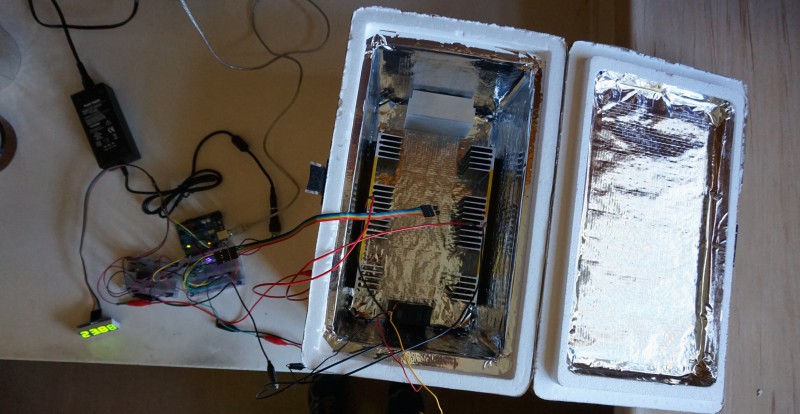Hello all, it's noon here on the West Coast and we're ready to kick off the Hack Chat. We're excited to have Noah, Sebastian, and David from Incuvers today, here to talk about how the company is "Disrupting Cell Biology" with some instruments that have some pretty deep hacker roots.
Welcome, Incuvers folks! Think you can kick us off with a round of introductions?
 Hey guys! Thanks for joining us. For those who don’t know much about us, we are a startup based out of Ottawa, Canada called Incuvers and we’re about to release a live cell imaging incubator called IRIS that lets researchers to remotely monitor and record all their experiments. Our website is www.incuvers.com if you want to see more about what we’re all about!
Hey guys! Thanks for joining us. For those who don’t know much about us, we are a startup based out of Ottawa, Canada called Incuvers and we’re about to release a live cell imaging incubator called IRIS that lets researchers to remotely monitor and record all their experiments. Our website is www.incuvers.com if you want to see more about what we’re all about!
 We're here! and we're live!
We're here! and we're live!
 Hi all!
Hi all!
![]() hi!
hi!
![]() Yo
Yo
 Hello
Hello
 Let's get started...
Let's get started...
 @Taiwo, let's !
@Taiwo, let's !
![]() hey where did the idea come from??
hey where did the idea come from??
 I think the best way to kick it off is where I heard about the project that would become Incuvers:
I think the best way to kick it off is where I heard about the project that would become Incuvers:
 Oh.. don't mind me.
Oh.. don't mind me.

https://hackaday.com/2015/07/25/get-biohacking-with-a-diy-co2-incubator/
Get Biohacking with a DIY CO2 Incubator
The [Pelling Lab] have been iterating over their DIY CO2 incubator for a while now, and it looks like there's a new version in the works. We've covered open source Biolab equipment before including incubators but not a CO2 incubator. Incubators allow you to control the temperature and atmosphere in a chamber.
 ya. So that beautiful piece of styrofoam you see there was the original incubator
ya. So that beautiful piece of styrofoam you see there was the original incubator
![]() How much of your business model is based on that of Makerbot?
How much of your business model is based on that of Makerbot?
 testing the standard quo on why incubators are so expensive
testing the standard quo on why incubators are so expensive
![]() I love the idea of "the YT of cellular research"!
I love the idea of "the YT of cellular research"!
 It's quite hackish looking
It's quite hackish looking
 @sebastian - Because they can be?
@sebastian - Because they can be?
 We built it to see if we could get something working for a few hundred bucks that normally cost 8K
We built it to see if we could get something working for a few hundred bucks that normally cost 8K
 and it worked!
and it worked!
 @Dan Maloney Exactly...
@Dan Maloney Exactly...
 Stick it to the man!
Stick it to the man!
![]() are my questions showing up?
are my questions showing up?
 The economics and business of science don't favour the scientist
The economics and business of science don't favour the scientist
 Yeah - I used to work in bio labs, and the insides of $100,000 instruments look like somebody's kid's science fair project.
Yeah - I used to work in bio labs, and the insides of $100,000 instruments look like somebody's kid's science fair project.
 @Paúl What do you mean exactly my their business model >
@Paúl What do you mean exactly my their business model >
 @Paúl yes they are!
@Paúl yes they are!
 What is the professional status of HardwareX? https://www.sciencedirect.com/science/article/pii/S2468067218301184
What is the professional status of HardwareX? https://www.sciencedirect.com/science/article/pii/S2468067218301184
![]() Well, Makerbot started by selling their little Cupcake kits, and that spawned a whole series of other printers and a number of other businesses, e.g. thingiverse, shapeways
Well, Makerbot started by selling their little Cupcake kits, and that spawned a whole series of other printers and a number of other businesses, e.g. thingiverse, shapeways
![]() Do you intend to follow that path, or to rephrase, where do you see Incuvers in 5-10 years?
Do you intend to follow that path, or to rephrase, where do you see Incuvers in 5-10 years?
 @Paúl glad you like the idea! Right now cell experiment photos and videos are completely decentralized. We're trying to fix that.
@Paúl glad you like the idea! Right now cell experiment photos and videos are completely decentralized. We're trying to fix that.
 Seems like the science suppliers all know that researchers have access to grant money and need to turn it into publications ASAP. Forces the economics and favors soaking them.
Seems like the science suppliers all know that researchers have access to grant money and need to turn it into publications ASAP. Forces the economics and favors soaking them.
 *seeking them, as in high prices
*seeking them, as in high prices
 @Paúl we see Incuvers taking a pretty similar model to makerbot actually. The "youtube of cellular research" is also intended to kind of be a "thingiverse of cellular research"
@Paúl we see Incuvers taking a pretty similar model to makerbot actually. The "youtube of cellular research" is also intended to kind of be a "thingiverse of cellular research"
 In 5-10 years we hope to provide as much if not more value with our open software platform as we do with our hardware
In 5-10 years we hope to provide as much if not more value with our open software platform as we do with our hardware
 @Dan Maloney It's also the fact that there's a great deal of R&D cost vs market size. To justify the price, you need to charge significantly higher
@Dan Maloney It's also the fact that there's a great deal of R&D cost vs market size. To justify the price, you need to charge significantly higher
![]() that's very cool. What sort of licensing do you see being applied to the data uploaded to your services?
that's very cool. What sort of licensing do you see being applied to the data uploaded to your services?
![]() e.g. if Merck can save $500k on an internal cell trial by using data uploaded by some researcher, and make $100m from some drug developed from such a trial, how should the researcher that shared that video be rewarded?
e.g. if Merck can save $500k on an internal cell trial by using data uploaded by some researcher, and make $100m from some drug developed from such a trial, how should the researcher that shared that video be rewarded?
 @David Troetschel there is a paper draft that has been sitting in limbo for a while, we hope to publish it soon though!
@David Troetschel there is a paper draft that has been sitting in limbo for a while, we hope to publish it soon though!
![]() you could do quite well working out licensing / data sharing agreements with drug or healthcare companies in conjunction with the biomed researchers that are making this data!
you could do quite well working out licensing / data sharing agreements with drug or healthcare companies in conjunction with the biomed researchers that are making this data!
 @Paúl Excellent question. Every researcher will have full privileges as to whether they share their data for others
@Paúl Excellent question. Every researcher will have full privileges as to whether they share their data for others
 @David Sean thats good to hear
@David Sean thats good to hear
![]() although I will concede that a lot of cellular research isn't really applicable to drug development / discovery
although I will concede that a lot of cellular research isn't really applicable to drug development / discovery
 Its becomes a slippery slope to start applying licensing on their data. For all the obvious reasons.
Its becomes a slippery slope to start applying licensing on their data. For all the obvious reasons.
 Technically, that's tax payers money too!
Technically, that's tax payers money too!
![]() yes of course!
yes of course!
 It's something I foresee evolving as we move forward. With the help of scientists and large biotech companies. To ensure rightful ownership etc..
It's something I foresee evolving as we move forward. With the help of scientists and large biotech companies. To ensure rightful ownership etc..
![]() but it's an as-yet unexplored space; I'm sure there's some way that you could succeed in spite of those challenges
but it's an as-yet unexplored space; I'm sure there's some way that you could succeed in spite of those challenges
 absolutely
absolutely
 we wouldn't be doing it if we didn't think we could pull it off
we wouldn't be doing it if we didn't think we could pull it off
 we must seize the means of production...
we must seize the means of production...
 @David Troetschel ahaha
@David Troetschel ahaha
 lol
lol
 but really
but really
![]() you could talk to Elsevier
you could talk to Elsevier
![]() only half /s
only half /s
 carpe fabricatio
carpe fabricatio
 @Paúl It'll be interesting to see how they evolve too. Their entire business model is pretty crazy
@Paúl It'll be interesting to see how they evolve too. Their entire business model is pretty crazy
 @Conrad :)
@Conrad :)
 charging people to have access that they're paying for anyways
charging people to have access that they're paying for anyways
 We're starting to see open science paper gain a lot of traction. The stigma of publishing in them is fading
We're starting to see open science paper gain a lot of traction. The stigma of publishing in them is fading
 and truthfully, everyone wins.
and truthfully, everyone wins.
 still waf as evidence of last defcon though
still waf as evidence of last defcon though
![]() how do you know if a cellular growth video is real or ai-generated? o.O
how do you know if a cellular growth video is real or ai-generated? o.O
 lol
lol

https://pdos.csail.mit.edu/archive/scigen/
SCIgen - An Automatic CS Paper Generator
One useful purpose for such a program is to auto-generate submissions to conferences that you suspect might have very low submission standards. A prime example, which you may recognize from spam in your inbox, is SCI/IIIS and its dozens of co-located conferences (check out the very broad conference description on the WMSCI 2005 website).
 So sick of running up against paywalls while researching topics for Hackaday articles. Recently hit one for a 60 year old paper with a total of five citations. WHat's that about?
So sick of running up against paywalls while researching topics for Hackaday articles. Recently hit one for a 60 year old paper with a total of five citations. WHat's that about?
![]() could have people faking data!
could have people faking data!
![]() @Dan Maloney use sci-hub.tw !
@Dan Maloney use sci-hub.tw !

 @Paúl that's a good point actually! We will have to validate legitimacy somehow
@Paúl that's a good point actually! We will have to validate legitimacy somehow
 or request a copy via researchgate, although maybe not for a 60 year old paper...
or request a copy via researchgate, although maybe not for a 60 year old paper...
 libgen exists
libgen exists
 @Paúl They would have to own our system, and some how fake it through our optics... That's a lot of work for trying to fake it. Good luck!
@Paúl They would have to own our system, and some how fake it through our optics... That's a lot of work for trying to fake it. Good luck!
 I actually requested a reprint. The publisher said they'd get back to me once they cleared it with the authors. All of whom have been dead for decades.
I actually requested a reprint. The publisher said they'd get back to me once they cleared it with the authors. All of whom have been dead for decades.
 oh god
oh god
![]() @sebastian I assume you use a USB camera? they could just swap it for a usb-out UVC device!
@sebastian I assume you use a USB camera? they could just swap it for a usb-out UVC device!
![]() One issue researchers might be afraid of is being scooped. In areas, where competition is tough, no one wants to share "too" much.
One issue researchers might be afraid of is being scooped. In areas, where competition is tough, no one wants to share "too" much.
![]() @Saren Tasciyan Usually open-data archives are published after the paper is out, so 'scooping' is prevented (mostly)
@Saren Tasciyan Usually open-data archives are published after the paper is out, so 'scooping' is prevented (mostly)
![]() gets harder when you have multiple papers!
gets harder when you have multiple papers!
 @Saren Tasciyan tbh moment of fame or what?
@Saren Tasciyan tbh moment of fame or what?
 @Saren Tasciyan yes this is true! Researchers have the option to share or not. So if people don't want to share they don't have to
@Saren Tasciyan yes this is true! Researchers have the option to share or not. So if people don't want to share they don't have to
![]() it's hard to justify your grant proposals when all or some of your previous proposals have been copied/scooped by someone else who takes credit for them @David Troetschel
it's hard to justify your grant proposals when all or some of your previous proposals have been copied/scooped by someone else who takes credit for them @David Troetschel
 We have talked to a couple folks who want to stay private. But it becomes a marketing platform for them after they publish.
We have talked to a couple folks who want to stay private. But it becomes a marketing platform for them after they publish.
![]() @Paúl Oh, sure. Sometimes, idle projects also kept secret for "just in case" forever.
@Paúl Oh, sure. Sometimes, idle projects also kept secret for "just in case" forever.
 a patent is just the right to sue, so at-least in the United States it becomes a case of sellout or trade secret and limited market. @Paúl
a patent is just the right to sue, so at-least in the United States it becomes a case of sellout or trade secret and limited market. @Paúl
 I have been reading, trying to follow, wondering what you are trying to accomplish. Is this about startups, or publishing and credits? Most of the successful ones don't tell anyone what they are doing, do it, charge a fair price, and go on about their lives. If you have a product that does what you say it will do, meets all the requirements, and helps people, that fits the way things have gone on until now.
I have been reading, trying to follow, wondering what you are trying to accomplish. Is this about startups, or publishing and credits? Most of the successful ones don't tell anyone what they are doing, do it, charge a fair price, and go on about their lives. If you have a product that does what you say it will do, meets all the requirements, and helps people, that fits the way things have gone on until now.
![]() I agree that all projects financed by the state need to be published/shared eventually. If that process is simplified and monitored, then great!
I agree that all projects financed by the state need to be published/shared eventually. If that process is simplified and monitored, then great!
 ....and reproduce! we want people to share experimental setups between systems. essentially so that an author that uses our incubation system can share the "protocol" that can easily be imported to other units to be reproducable
....and reproduce! we want people to share experimental setups between systems. essentially so that an author that uses our incubation system can share the "protocol" that can easily be imported to other units to be reproducable
 exactly
exactly
 A citation, but verification of physical reproduction and operation
A citation, but verification of physical reproduction and operation
![]() do you expect to extend your system to liquid sample delivery or spectrometry?
do you expect to extend your system to liquid sample delivery or spectrometry?
 open source hardware should have a system to verify reproduction it seems
open source hardware should have a system to verify reproduction it seems
 we would love to have a fluidic setup in the future
we would love to have a fluidic setup in the future
![]() if you don't, someone else will make a secondary market for those addons
if you don't, someone else will make a secondary market for those addons
 @David Troetschel , yes also that researchers all have their niche requirements which can be challenging to implement using standard industrial incubators. We intend for ours ( powered by a raspberry pi and an arduino) to be modded if need be.
@David Troetschel , yes also that researchers all have their niche requirements which can be challenging to implement using standard industrial incubators. We intend for ours ( powered by a raspberry pi and an arduino) to be modded if need be.
![]() but do be aware of scope creep
but do be aware of scope creep
 @Paúl that's very true. Depending on how things go, we might explore the development of those add-ons ourselves
@Paúl that's very true. Depending on how things go, we might explore the development of those add-ons ourselves
 Yes, government/publically funded research should be open, but it is hard to enforce.
Yes, government/publically funded research should be open, but it is hard to enforce.
You can start a nonprofit for sharing. For profits are prevented by law from working together except with strict legal oversight. It can be done either way.
Traceability or "auditability" are two words I find useful.
 In the future
In the future
 3rd party addons are fine!
3rd party addons are fine!
 @Paúl Are you in a lab ?
@Paúl Are you in a lab ?
![]() @David Sean Fluidic automation is tough!
@David Sean Fluidic automation is tough!
![]() @sebastian how secure can a raspberry pi really be? someone could just train a neural net on videos of cell colonies dying, then get the NN to spit out a completely unique video of a cell colony dying and claim it was from their drug!
@sebastian how secure can a raspberry pi really be? someone could just train a neural net on videos of cell colonies dying, then get the NN to spit out a completely unique video of a cell colony dying and claim it was from their drug!
 yeah, we are putting that one hold, but keep it open in that we will have an access port on the side
yeah, we are putting that one hold, but keep it open in that we will have an access port on the side
![]() @sebastian I am in a laboratory, but not a microbiology lab at the moment. feel free to PM me
@sebastian I am in a laboratory, but not a microbiology lab at the moment. feel free to PM me

 Lutetium
Lutetium

Discussions
Become a Hackaday.io Member
Create an account to leave a comment. Already have an account? Log In.